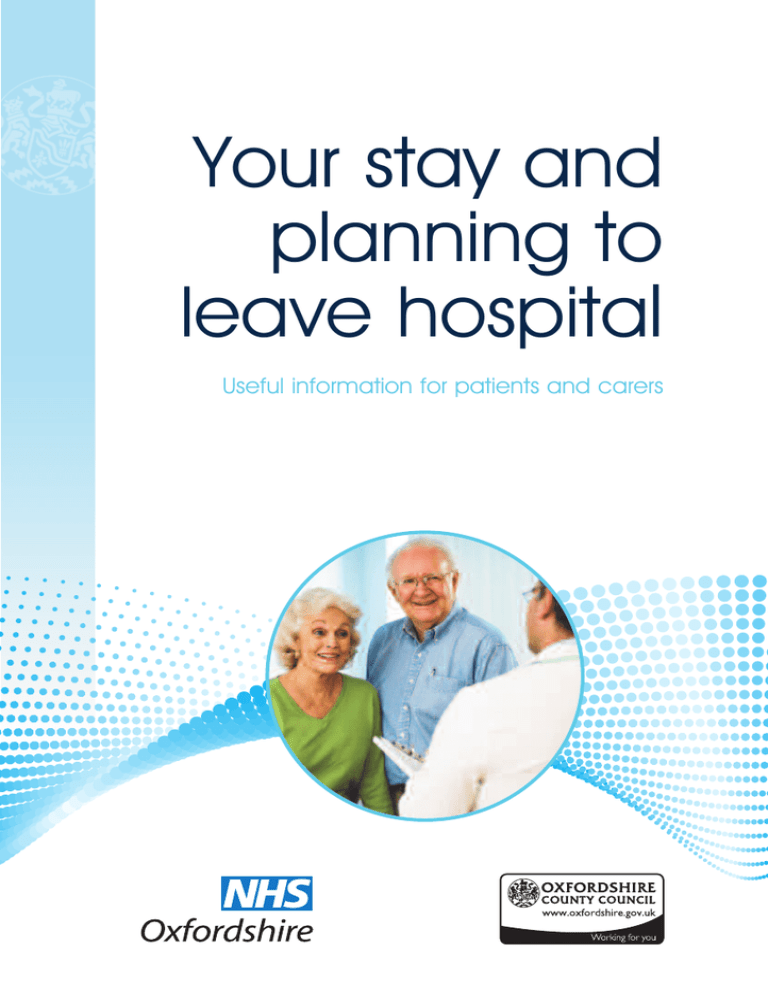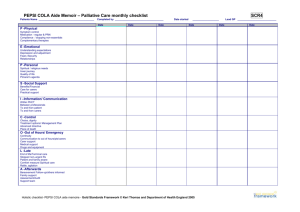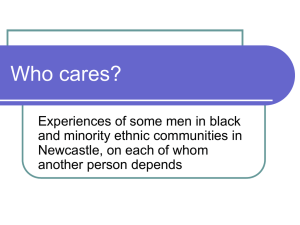l Your stay and planning to leave hospita
advertisement

Your stay and planning to leave hospital Useful information for patients and carers Introduction Our aim is to provide you with the nursing and medical care you need during your stay in hospital and to ensure that you have the appropriate care you need when you leave. If you do require long term care on leaving hospital you will be given support and advice to arrange this. It is not in your best interest to stay longer than necessary in a hospital environment. Getting the right care and support after leaving hospital will help your recovery. Please be assured you will not be asked to leave until you have been assessed as clinically fit to be discharged. Recovery and rehabilitation can be provided in your own home, or may be in a community hospital or an intermediate care bed in a nursing home. Your Recovery In our experience as medical professionals we find that many patients recover better with proper care and support in the familiar surroundings of their own home. fit’ you will be ready for discharge and an assessment will be made to determine the level of help and support you need to enable you to leave hospital. Your recovery and rehabilitation may require co-operation between a number of health and social care staff, including carers in both hospital and the community. We will at all times ensure that both you and your carer are kept informed of what is being decided. A hospital ward is not the best place to continue your recovery once your acute illness is over as staying in hospital too long can make you lose confidence in your ability to look after yourself and may increase your risk of acquiring an infection. Can I stay in hospital? During your time in hospital your Care Team has made regular assessments of your abilities and needs. When you are assessed as being ‘clinically Other people need acute beds and we have a responsibility to make sure beds are vacated promptly to free them up for further use. During your assessment it will be decided whether you can live safely and independently at home, or if you will need special adaptations or equipment to help with your rehabilitation or ongoing care. Throughout this process every effort will be made to ensure wherever possible we meet your preferences on what you would like to happen next. However sometimes, due to a lack of vacancies at the time, the care offered may not be the care you prefer. In this situation we ask that you agree to be discharged to a place that meets your assessed needs. This will not prevent you being offered the opportunity to move again once a vacancy arises in your preferred place. We will support you through this process and you have the right to ask for a review of all decisions taken. Transfers to Community Hospitals We will aim to transfer you to the community hospital closest to where you live, but sometimes this may not be possible. We are not able to offer a choice of community hospitals. The priority is to transfer you as soon as it is appropriate, so you can start the intensive therapy and rehabilitation necessary for your recovery and be assessed for any long term care needs which cannot be met in an acute hospital. So what do they do? The team that looks after your care both inside and outside of the hospital is made up of a number of professionals depending on your care needs. So what do they do? Hospital Social Worker/ Care Manager They work with you, your family and carers to provide assessments, advice and information. They will identify any assistance you may need when you leave hospital, and the ways in which this can be provided to support you. This may mean giving information to you or arranging the appropriate services. If you already have a social worker or carer the hospital social worker or care manager will link with them. Occupational Therapist Occupational therapists help you to stay as independent as possible when it comes to personal care and domestic activities in the hospital and at home. Occupational therapists can assess and recommend special equipment to help daily living at home such as rails or a raised toilet seat. Physiotherapist Dietician Physiotherapists assess aspects of your mobility and provide advice on exercises to help you regain mobility you may have lost. Dieticians assess your nutritional requirements.They advise about special diets and can suggest alternatives to a full meal if you do not feel like eating.Their advice will fit in with your treatments. They also deal with problems such as chronic pain, breathing problems and anything else that affects your ability to move or walk independently. Speech and Language Therapist Assess speech, language and swallowing difficulties and give advice on how to cope with these problems. Specialist Nurses Specialist nurses are qualified nurses who have additional skills and training in a particular area. Examples are diabetes, asthma or breast care. They can offer specialist advice and support for your condition. Pharmacist Enablement Service The pharmacist will ensure that the medicines you were taking at home are available to you in hospital. They will recommend any changes. This team can provide you with short-term support when you leave hospital. They help you to become as independent as possible. They can also explain what any new medicines are for, how to take them and any common side effects. They will supply your medications to take home on discharge. Case Manager District Nurse A district nurse is a qualified nurse with additional training to nurse you at home. They work closely with your GP to support your care at home. If you have a longer term condition, a case manager should visit you at home in order to co-ordinate the care you need. They will help you monitor and cope with long-term conditions and focus on helping you avoid crises. What can I do if I’m not happy with the service I am receiving If you are not happy with the care you are receiving in hospital, you can contact the Patient Advice and Liaison Service through the hospital switchboard. The service may be able to offer you practical solutions to your problems or explain how you can make a complaint. If you want to make a complaint or comment about the way arrangements have been made, or any other aspect of the support you receive, please contact the Social and Community Services Comments and Complaints Team on 0845 050 7666. A social worker will also be able to give you a leaflet about this service. What is a Carer? If you are helping to look after a relative, child, friend or a neighbour who needs your support because of an illness, disability, frailty or an addiction then you are a Carer. It is important that you know there is support available for you. See details below for the Carers Centres and the Oxfordshire County Council Access Team. Useful numbers Age UK Oxfordshire 01235 849 400 Help plan your care or residential placement if required. Help with completing forms to apply for benefits. British Red Cross 01235 552660 For short term hire of equipment. Alzheimer’s Society Help and advice for patients and their carers. Oxford 01865 205192 www.oxoncarers.org.uk Support for carers through advice, groups and activities. Abingdon and Vale 01235 205407 Banbury and District 01295 811144 Oxford Branch 01865 876508 Benefits enquiry line 0800 882200 Help with questions about benefits and allowances. Carers Centres Banbury 01295 264545 Didcot 01235 510212 Emergency Carers Support 01865 374430 Support and care for people when the main carer has to go to hospital, out unexpectedly or away overnight. Carers Support Service – Rethink (For carers of adults of working age with mental illness only) 01865 455877 Carers Forum Oxfordshire 01235 547180 Cinnamon Trust (pet care) 01736 757900 Caring for pets when their owners are taken into hospital through ill health. Citizens Advice Bureaux Available in most market towns in the county 0844 5730 608 Oxford Banbury 0844 848 7922 Witney 01993 705 691 Abingdon 01235 521 894 Also available in many of the other market towns in the county, providing advice on a wide variety of issues such as finance and legal. Continence Advisory Service 01993 209 434 Advice and support on treatment and how to cope with continence problems. Falls Prevention Service (via GP referral) Provides access to advice and services promoting mobility and safety. NHS Direct 0845 4647 Help and advice on health related issues. Patient Advice and Liaison Service To discuss concerns, complaints and other issues related to patient care. John Radcliffe 01865 221 473 Horton 01295 229 259 Primary Care Trust 0800 052 6088 Patient and Public Involvement Complaints 01865 336 786 Oxfordshire Family Information Service (OFIS) 0845 226 636 A central point of information, signposting and support for parents and carers. Oxfordshire County Council – Access Team Single point of contact for any need related to care and support, equipment, disabled badges etc. 0845 050 7666 To give feedback, complain, to check if this is the most up-to-date version or to request alternative formats of this document contact: The Access Team Oxfordshire County Council PO Box 780 Oxford OX1 9GX Tel: 0845 050 7666 Fax: 01865 783 111 Email: access@oxfordshire.gov.uk Alternative formats of this publication can be made available on request. These include other languages, large print, Braille, audio cassette, computer disk or email. Please telephone 0845 050 7666 DGN 0021/1/version 2.0 (Expires July 2011) S214-01 (08/10)






